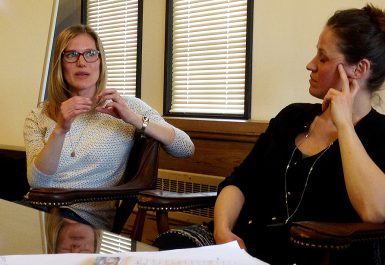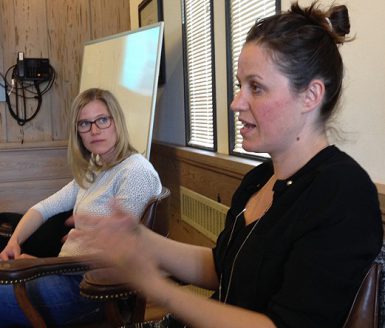German broadcasters discuss practices in their country, U.S.

German broadcasters Giusi Valentini and Jenny Witte discussed life as freelance journalists, the role of online publications and the challenges of German media practice in a presentation Monday afternoon in Ernie Pyle Hall.
The two are visiting campus this week as part of the Radio in the American Sector exchange program sponsored by the Radio Television Digital News Association. In alternating years, German and U.S. broadcasters visit the other’s country to learn about media practices.
Witte and Valentini were joined by faculty and students in the lounge for the informal chat. They first talked about practical differences, such as how German broadcast companies rely on freelancers for reporting, with editors having contracts.
“It is quite stressful, and I would prefer to get a proper contract, but it is not that easy anymore,” said Witte, a reporter who works both for television and the public radio station Norddeutscher Rundfunk in Hamburg, “You should really want to do the job, or it is a lot of insecurity.”
One week a month, Valentini, a freelancer, travels to Cologne from Berlin to work for WDR, making a show for Italians in Germany. The show involves German topics, as well as news regarding Italy and Italian immigrants.
“The public broadcaster decided that each of these groups should have a broadcast in their own language, so that they could know what was going on in Germany as well as everyday things that they need to know,” she said. “My work is to put it together with Italian music and make it interesting for the Italian community in Germany.”
Valentini researches topics and tries to pitch two or three stories to different editors every week.
“You can either try to find a way to the editor and pitch your ideas, or go through a production company and work for them,” Valentini said. “As a freelance journalist, I have to sell my stories to multiple stations, maybe from different perspectives.”
Eleven people are traveling with the two from Germany, and when the Germanwings airplane crash story broke, many of them were frustrated they were not in the country to cover one of the biggest stories of the year.
“That’s the way you start to look at things, like ‘is this a story’?” Witte said.
Competition between private and public broadcasting is not good, the pair said. Private TV is doing more reality and talk shows, which affects viewership on the public end as well.

“The broadcasting stations are starting to do more shows on celebrities, because if no one watches it, then they don’t get the fee for it,” said Witte.
Ownership of their produced content has been an issue for German journalists. If a broadcaster uses a publication’s camera equipment, the broadcasters give up the right to distribute what they made to other publications.
“In Germany, if you are a video journalist, you spend $1,500 on your own equipment and then you can own the story. You research it, write the transcript, film it, edit it — you do the whole package,” said Valentini.
Doctoral student Philip Anderson asked if the broadcasters felt any “push back” from the government because of funding purposes.
“Our role is to be the watchdogs of the government. We are not funded directly by the government; we are funded directly by the people who pay a fee for public broadcasting. That way, there is no propaganda,” said Witte.
According to Witte and Valentini, the German people have the right to say no to having their statements or images broadcast if they do not like the way they were represented. Some commercial stations are misrepresenting their sources and taking what they say out of context.
“A lot of experts are avoiding commercial, so it is always good to say you are from public services,” said Witte.
The doctoral students attending were interested in the international perspective of the broadcasters.
“To understand how journalism works in this increasing globalized society, we as journalism students must learn the norms and practices of other cultures because news is no longer an isolated series of events,” Anderson said.
The RIAS participants will spend the week in Indiana, visiting IU classes and broadcasting stations. Next week, they travel to New York before going back to Germany.

